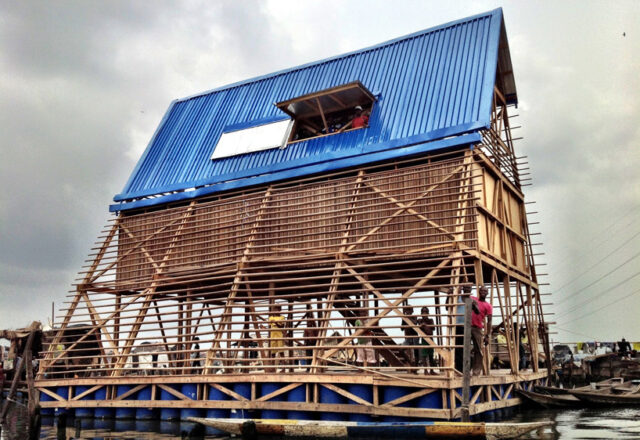
A Nigerian architect behind Makoko Floating System (MFS) Kunkle Adeyemi has exclaimed that “Instead of fighting water, we want to learn to live with it,”
The MFS is simply an initiative to build on water by hand.
The constant purchases of lands within water locations in Lagos and the habitual sand filling of Lagoons especially from 2017 till date has become a thing of scare from the analysis of environmentalist. Notable amongst others, regarding this fear is John Ekoko, he lamented the negative effects of the sand filling of Lagoons in some parts of Lagos by the state government, and sounded a note of warning against its consequences.
Ekoko, who was a former chairman of the Nigerian Environmental Society, Lagos Island Chapter, said: “I want to use this opportunity to remind the state government that climate change is real, the world over. “The sea level is increasing as a result of the melting ice and that is why the issue of flooding is becoming very, very dangerous.”
In the same vein, a former surveyor-general of the federation, Prof. Peter Nwilo, advised the state to stop construction and all sand filling works around Lagoon and waterfronts.
He made this statement while reacting to the massive flooding in the state, especially around Lekki, Victoria Island, Ajah, Ikoyi and Lagos Island, following torrential rainfall.
He thus recommended the process of Floating architecture stating that there was really no need for the government to fight the water when they can actually live with it. He further drew an attention to the fact that while the government was “fighting” the water, another community in the city, Makoko, was conveniently living with it.
Recall that Makoko is a region in Lagos slum that “sits on stilts above the waterline” and “navigated by canoe”. The “innovative and resourceful living” in Makoko inspired Architect Adeyemi’s Makoko Floating System (MFS). The MFS was designed to address the key issues faced by major world cities such as rapidly expanding urban development and the impacts of climate change. “It is a prefabricated, modular, floating A-frame, sustainable timber structure that can be locally produced, assembled and disassembled, quickly and manually for developments on water, in advanced or developing regions around the world.”
The first prototype of the MFS tagged MFS I was created in 2012: Makoko Floating School was built for the Makoko community which inspired the MFS initiative. It was a floating school built to withstand storms and floods and educate children from the slum.
According to the architect Kunle, the objective of the project was to generate sustainable, ecological, alternative building systems and urban water cultures for the teeming population of Africa’s coastal regions. Sadly however, the project collapsed seven months after its official opening, reasons being that the wooden school was brought down by heavy rains.
Speaking on the sad Incidence however, Architect Adeyemi, the founder of NLÉ, explained that the building collapsed “due to deterioration resulting from a lack of proper maintenance”.
With lessons learnt from the MFSI, Adeyemi improved on the initiative and took it outside the shores of Nigeria with the next stage tagged MFS II. From Lagos to Venice, Italy. MFS II was designed to suit local conditions and a wider waterfront population. It was assembled in 10 days by 4 builders and was exhibited as WATERFRONT Atlas at the 15th International Architecture Exhibition – La Biennale di Venezia. It is mobile, deployable, and prepared to be reassembled at the next Waterfront. The project was awarded the Silver Lion prize.
A further improvement was made with MFS III Minne Floating School (2018) The MFS III was designed as a fully prefabricated, modular, flat-pack, floating building system. It has a 25-year design life, based on Euro codes for wider regional use. It is located in Bruges in Belgium.
The fourth prototype was MFS IIIX3: Makoko goes to China – Minjian Floating System (2018) prototype and third iteration of the Makoko Floating School. It is in Jincheng Lake in Chengdu’s new ecological belt
MFS IV: Makoko back in Africa – Floating Music Hub, Cape Verde (2020) This is an exciting project that has been listed by CNN as one of Africa’s most anticipated architecture projects in 2020. It’s listed as one of the transformative buildings set to shape the world in 2021.
The question by many Nigerians with regards to this exciting development is that why are we running backwards? especially when we have a great opportunity to shape an aspect of the country’s future in 2020 with one of the transformative buildings set to shape the world in 2021.
This design contains three floating vessels which will house a multipurpose live performance hall, a state of the art recording studio, and a food & beverage bar connected by a floating plaza. CNN notes that it’s the first time an MFS structure has been built in the Atlantic Ocean.
Meanwhile the clamour has begun that Architect Adeyemi should come back to Nigeria to complete his unfinished business at home. In its 2016 report about the collapse of the Makoko floating school, Architect Adeyemi confirmed that the Makoko community was considering upgrading the structure and rebuilding an improved version of the school. With the success of the various iterations of the MFS across the world, the time is ripe to not only rebuild Makoko floating school but also expand the initiative in Lagos and possibly other parts of Nigeria.
Expectations are high from well-meaning Nigerians regarding this project, as they contemplate the prospect of this new alternative of living around these waterfronts possibly all over the country. No doubt this would be a huge success as so many experiences has been gained over the years by the renowned architect Adeyemi.
Gift Joseph Okpakorese
Staff Writers







